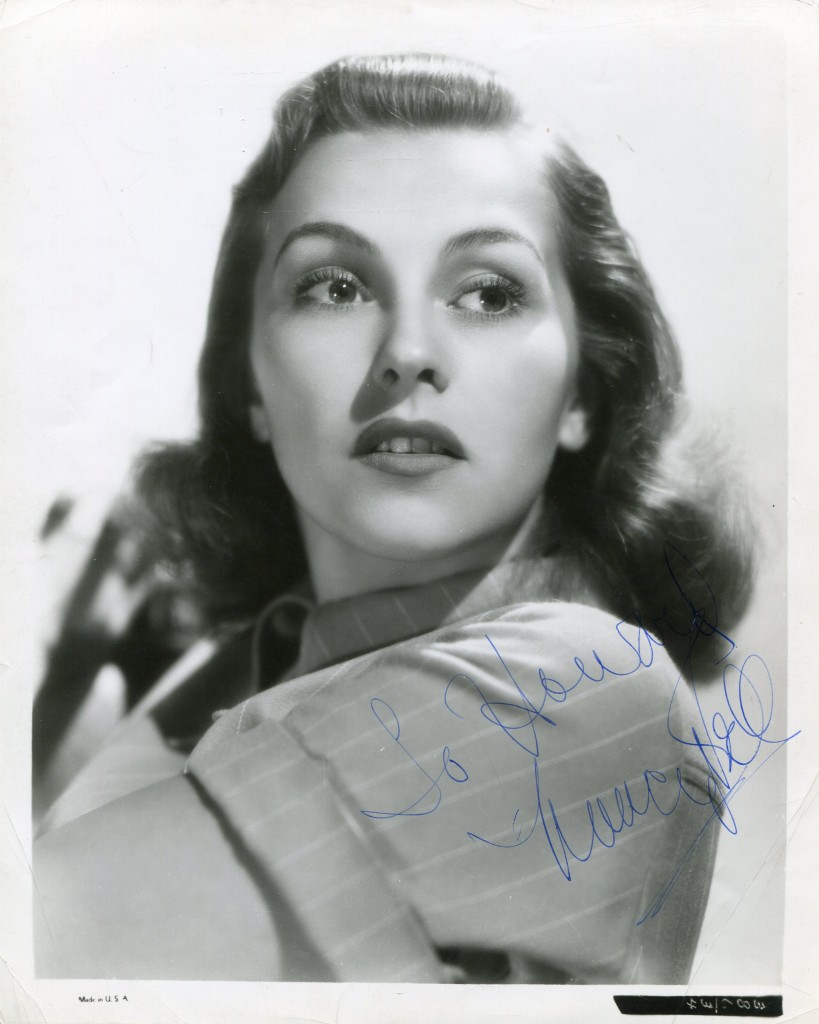
Nancy Kelly was born in 1921 in Lowell, Massachusetts. She was the sister of Jack Kelly who starred with James Garner in “Maverick”. Her films include “Jesse James” with Tyrone Power in 1939, “Murder in the Music Hall” with Vera Ralston in 1945 and repeated her Broadway success in “The Bad Seed” in 1956. She died in 1995 aged 73.
Dick Vosburgh’s obituary in “The Independent”:
Although she made more than 30 films and received an Academy Award Best Actress nomination, Nancy Kelly’s greatest triumphs were in the theatre.
One of New York’s most successful child models from infancy, she made her first appearance on the Broadway stage at the age of 10 in Give Me Yesterday (1931). A role in Rachel Crothers’s Susan and God (1937), which ran for two seasons on Broadway with Gertrude Lawrence heading the cast, led to a 20th-Century Fox screen-test for Kelly, swiftly followed by a long-term contract and a leading role in John Ford’s Submarine Patrol (1938). Frank S. Nugent wrote in the New York Times: “Here’s a morning g un forNancy Kelly, who has the responsibility of being the only girl in the cast, not merely by being as decorative as she is, but with a charming and assured performance. Miss Kelly bears watching; in fact, it will be a pleasure.”
A year later, the same paper’s Bosley Crowther was equally enamoured of Kelly, to the extent that he actually forgave Fox for crowbarring her into Stanley and Livingstone as the patently fictitious object of Henry Morton Stanley’s affection. “We don’t see,” he wrote, “how any one could be so officious as to demand that the presence of an actress so charming must also be supported by documents.”
Despite effusions from critics, Fox assigned Kelly a pallid “Outlaw’s Noble Wife” role in Jesse James (1939), put her into minor fluff like He Married His Wife and Sailor’s Lady (both 1940), and loaned her out for the likes of One Night in the Tropics and Parachute Battalion (both 1941). Her last film for 20th Century-Fox was To the Shores of Tripoli (1942) in which the studio showed its indifference by letting her lose John Payne to Maureen O’Hara.
A return to Broadway to play Alec Guinness’s wife in Terence Rattigan’s London success Flare Path (1942) was a disappointment; the play ran only three weeks. In Tarzan’s Desert Mystery (1943), Kelly was cast as a wisecracking vaudeville magician in a plot that also found room for Nazis, giant spiders, sinister Arabs and dinosaurs. In Show Business (1944) she played a scheming burlesque performer, hell-bent on breaking up the marriage of George Murphy and Constance Moore. Such was the skill of her actingthat she actually managed to simulate convincing lust for Murphy.
After a handful of films in which she was paired with such fading leading men as William Gargan, Lee Tracy and Chester Morris, Kelly returned to Broadway. Her experience with the studios could only have helped her performance as John Garfield’s Hollywood-hating wife in Clifford Odets’s searing play The Big Knife (1949). Four years later she played another tortured Odets wife in a tour of The Country Girl. Her performance as the agonised mother of an eight-year-old murderess in Maxwell Anderson’s Broadwa y hit The Bad Seed (1954-55) won her a Tony Award. Two years later Kelly and other key members of the New York cast journeyed west to make the screen version. She received her Oscar nomination for her work in the film.
Kelly twice received the Sarah Siddons Actress of the Year Award in a theatre career that embraced such disparate playwrights as Shakespeare, Neil Simon and Edward Albee. Her television work included Alfred Hitchcock Presents, Climax and The Pilot (1956), a TV biography of Sister Mary Aquinas, a noted educator and the first nun to be granted a pilot’s licence. Variety reported: “Miss Kelly humanised Sister Mary and made a colourful, interesting and touching character out of her.” For this performance, Nancy Kelly added an Emmy Award to her crowded mantelpiece.
The above “Independent” obituary can be accessed online here.

